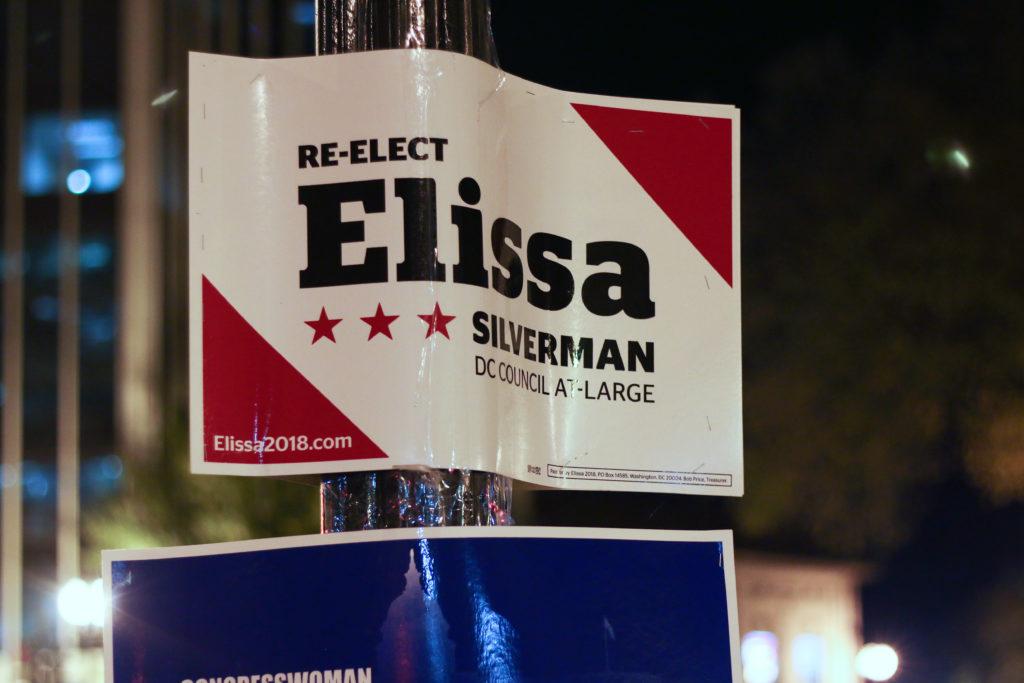In one of the only contentious local races in the midterm elections, current and former students involved with local politics are backing incumbent Elissa Silverman for one of two D.C. Council at-large seats.
Silverman, I-at-Large, is facing off against restaurant owner and Democrat Dionne Reeder, a first-time Council candidate, in a contentious race that attracted attention after Mayor Muriel Bowser endorsed Reeder in September. Students who worked with Silverman on local governing boards said she has been a “champion” for students and has been the most accessible council member.
“Elissa is someone who is willing to go to bat for students and she has proven that time and time again,” alumna and former West End and Foggy Bottom Advisory Neighborhood Commissioner Eve Zhurbinskiy said.
Support from students
Zhurbinskiy said Silverman has long been a champion for students, like when she introduced legislation last month that would establish a District agency providing lower-interest loans to D.C. college students. Silverman also opposed a 2015 bill to expand the GW Police Department’s jurisdiction off campus, Zhurbinskiy said.
Zhurbinskiy said Silverman is one of the “most accessible” council members because she attends more ANC meetings than any other member of the D.C. Council.
[gwh_image id=”1071018″ credit=”Courtesy of the Office of Councilmember Elissa Silverman” align=”right” size=”embedded-img”]Elissa Silverman, I-at-Large, is facing off against restaurant owner and Democrat Dionne Reeder, a first-time Council candidate, in a contentious race. [/gwh_image]
“She is really willing to go into the communities and listen to people with concerns and not feel the pressure of appeasing big money donors,” Zhurbinskiy said.
James Harnett, an ANC commissioner and junior, said he knocked on doors for Silverman’s campaign, adding that students should support Silverman because she supports and represents D.C. residents’ interests.
He said Silverman is honest and willing to advocate for those who often get neglected by municipal politics and policy because of factors like socioeconomic standing or religious background.
“When it comes to standing for what’s right, she is always there and is one of the few people I can rely on to always be a voice for what’s right,” Harnett said.
Harnett and Zhurbinksiy said one of the principal reasons they back Silverman is because she fundraises from D.C. residents and does not accept donations from corporations. Silverman has criticized Reeder for accepting money from businesses and PACs – but the difference in strategy has led Reeder to continuously outraise Silverman.
Reeder raked in in $118,000 between Oct. 11 and Oct. 29, while the incumbent raised $71,000, The Washington Post reported Tuesday.
“She will listen to students, unlike her opponent who takes money from big corporations and has shown that she is in the pocket of these special interests,” Zhurbinksiy said of Silverman.
Where the candidates stand
Silverman said her platform focuses on making the District a more affordable place to live for students, workers and families, while Reeder said she wants to focus on improving employment opportunities and ensuring that D.C. college alumni stay in the city to work after graduation.
Silverman said the race has displayed the clear contrasts between her labor-friendly views and Reeder’s business-focused interests to voters. Silverman sponsored the Universal Paid Leave Amendment Act of 2016, which will provide paid leave to all D.C. workers by 2020 – a law Reeder has criticized as “burdensome on businesses,” The Post reported Oct. 25.
“I’ve welcomed the opportunity to defend my work on paid family leave and to defend my work as labor chair and to educate the voters about what I’ve been working on for them over the past four years,” Silverman said.
Despite the close race, the D.C. native said she is running on a campaign to make living in the District less burdensome financially – especially for college graduates – by creating more jobs in key industries, making housing more affordable and reducing student loan debt.
“I think my focuses are on the big things that matter,” Silverman said.
Silverman said her goals are made clear through her actions, like when she advocated last year for the installation of a helipad at the GW Hospital, which was approved in June in a unanimous Council vote to help make the hospital more accessible to residents across the Anacostia River.
Reeder said the contentious race shows she is a “credible” candidate who is able to challenge an incumbent.
“I must be doing something right, quite frankly, because you don’t usually get this much negative press around a local at-large race in D.C.,” she said.
Reeder said she wants to develop better relations with college students in the District and encourage them to become more involved in the D.C. community. She said education is “critically important,” and if elected, she hopes to establish a system to connect young college graduates with employment opportunities in D.C. so they will stay in the city after graduation.
“I think it’s something that we have to focus our attention on and make sure that not only are we educating properly, but we also are engaging students on college campuses around their civic responsibility,” Reeder said.
Reeder added that she would establish constituent service offices throughout the District, preferably near D.C. colleges, where students could intern and develop better relations with District residents.
“I see myself engaging on a regular basis with students in our higher learning institutions, but more importantly making it a meaningful experience for both,” she said.
Brooke Migdon, Dani Grace, Zach Schonfeld and Zoya Wazir contributed reporting.





